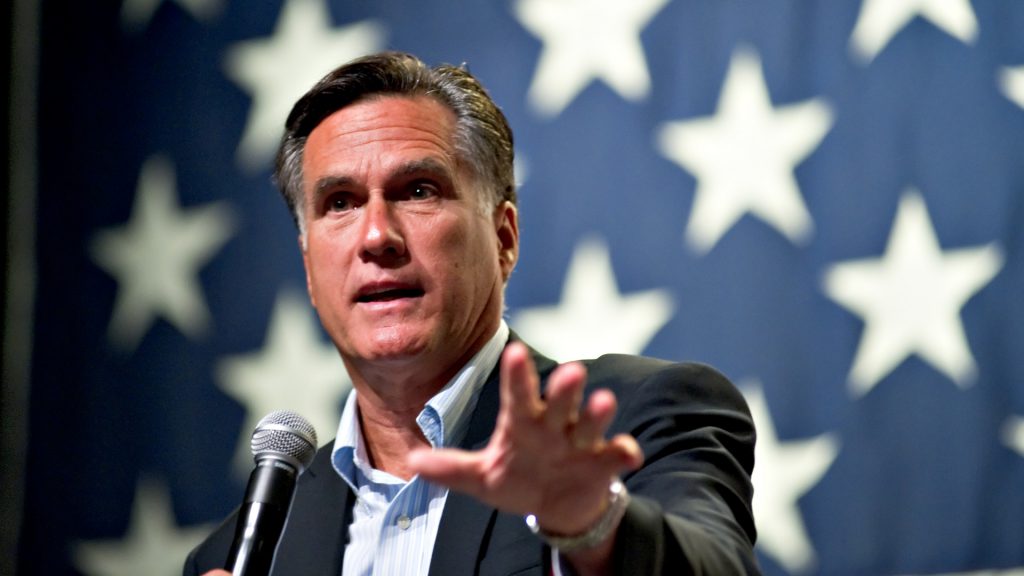
Published June 6, 2019
Republicans in Congress are confused about how to respond to President Trump’s multi-front trade war. With strong free-trade ideals but also cognizance of political and geopolitical concerns about Chinese competition, they stand paralyzed and inert. Mitt Romney can help them break out of their slumber.
Romney, now a senator from Utah, is uniquely positioned to lead his Republican colleagues on trade policy. He is unquestionably a leader of the party’s business and establishment wings. Those elements are strongly opposed to trade restriction, and deeply uneasy about Trump’s tariff wars, and they want nothing more than a quick end to all the conflicts. In principle, Romney shares nearly all of their concerns.
But Romney also was one of the first Republicans to see that China is different. His 2012 presidential campaign should have made more of that insight, but he nonetheless called for tariffs against China during that effort. Trump’s tariff war with China is an aggressive implementation of their shared vision.
Romney’s maiden speech on the Senate floor Wednesday touched on this but ultimately fell short. The speech focused more on presenting Romney’s views on U.S. foreign policy and immigration and placed his hawkishness on China in that context. He nonetheless asserted that action is required on all fronts. “It is past time for us to construct a comprehensive strategy to meet the challenge of an ambitious and increasingly hostile China,” he noted. He should take up the challenge he issued himself.
A comprehensive strategy to battle China requires allies, sacrifice and fortitude. It requires allies because without them China will seduce other developed countries to provide the markets, money and minds it seeks to build its power. That’s where Trump’s attempt to pick fights with seemingly every nation we trade with is counterproductive. A Romney-crafted strategy could give congressional leaders a road map to avoid those pitfalls.
Someone with Romney’s unquestioned personal decency and patriotism could also credibly make the case for sacrifice. The U.S. economy has become seriously intertwined with China’s. Confrontation with China will hurt many businesses and their workers. Romney could do what Trump has not and probably cannot: explain why some Americans will have to shoulder setbacks and burdens in the national interest.
Romney could also formulate policies that could mitigate those harms for all potential losers, not just a favored few. Trump’s unwillingness to think strategically has meant that he helps one set of Americans who are hurt by the trade war — farmers — while ignoring everyone else. A comprehensive policy would help businesses and employees hammered by the conflict, for example in the manufacturing and retail sectors. Romney has the gravitas and the policy chops to create such a policy.
A serious trade policy also needs to address workers whose jobs have been threatened or lost due to global economic issues. Trump won in no small part because many of those people, people who had voted for Barack Obama against Romney, saw Trump as their potential savior. Perhaps the global trade war that Trump has unleashed is not in our national interest, but doing little or nothing to address those dislocations is also foolhardy. Had Romney recognized this in 2012, he could have beaten Obama himself.
One of Romney’s 2012 advisers, Oren Cass, has written an excellent book containing many ideas to improve labor-market conditions for those dislocated workers. Romney and his staff should scour “The Once and Future Worker” for usable ideas and present those, and others from other thinkers, to craft a modern GOP global trade policy that cares about all of America’s workers.
Both the fight with China and the reformation of the U.S. labor market will take time. They are not quick battles that can be easily won. Fortitude means leaders care enough about winning these battles that they will persevere when the inevitable pitfalls, setbacks and challenges emerge. Such consistency can be sustained only if the efforts are placed in a moral framework of the national interest. Trump will not or cannot do this. Romney can.
If he does, Romney would be following in the footsteps of another Republican senator, Arthur Vandenberg, who represented Michigan from 1928 to 1951. Vandenberg originally supported the standard GOP isolationism of his time, but he changed his mind after Pearl Harbor and joined the internationalist camp. His leadership was crucial in procuring Republican support for the Marshall Plan and NATO. Without Vandenberg’s courage and leadership, the postwar international edifice Romney admires so much might never have existed.
Vandenberg’s portrait is one of only nine that have the honor of hanging today in the Senate Reception Room. Romney can join that rank if he, too, provides moral and strategic leadership to address the crucial issue of global trade. Mitt Romney, our nation turns its lonely eyes to you.
Henry Olsen is a Washington Post columnist and a senior fellow at the Ethics and Public Policy Center.







